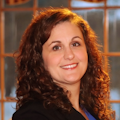I am a dental hygienist. To the general public and even to some dental professionals, that means I clean teeth. Those of us in the dental hygiene profession know we do so much more, yet we are regularly met with this limited and incorrect assumption about what we do. With that being said, how do we respond?
One choice might be to ignore the comments. How many times have you been asked, “You went to college for this?” or “Are you in training to be an assistant?” It can be easy to turn the other cheek, answer the question, and move on. It is common to hear the words “just a cleaning.” How many times have we said these words ourselves in an attempt to try to minimize the stress level for a patient?
Another choice might be to snap back in an attempt to “educate” and elevate your self-worth. In my experience, this tactic may help with your feelings in the short term, but snarky retorts typically do not foster respectful dialogue or understanding. Recipients may find you defensive and think it’s you who is behaving poorly. At best, they may feel badly that they have offended you, but it is unlikely that you have changed their thoughts.
Some might be asking at this point, “Does it matter what they think?” I believe that it does. In order for our profession to be viewed through the same lens as other health-care professionals, it is up to us to provide information, and to do so with both confidence and competence. This not only has the potential to enhance our relationships and effectiveness with patients, but also can positively impact career satisfaction.
If you are wondering how I responded to this patient, I decided to see it as an opportunity. Despite the initial sting, I saw that his intention was to compliment me, and it was a compliment coming from a place of incorrect or incomplete information. I saw a chance to have a dialogue about the profession that I care so much about.
My response sounded a lot like this: “Thank you so much for your kind words. I really appreciate the value you feel that I provide. I am very fortunate to have a job that I love. I also don’t want you to worry—I use my brain a lot! I understand that the general public doesn’t always know what my job involves and I always welcome the opportunity to provide more information and insight. Can I share with you a little bit about my career?” I then went on to share much of the following:
- I have a bachelor’s degree, and the coursework in my dental hygiene program included passing both didactic and clinical courses. I have taught clinical hygiene at a university for the past several years, and I can tell you that the program is comprehensive, stressful, demanding, and not for everyone.
- My peers and I are well educated in areas such as microbiology, chemistry, pharmacology, and oral pathology. We understand how general health conditions link to oral health. We’ve been trained to identify possible contraindications to treatment so that patient care can be customized for health and safety. We need these skills each day with each patient.
- We have been trained in the science and techniques of radiography so that the images we take minimize your radiation exposure. We also know how to expose images of the best diagnostic quality so that diseases and conditions such as asymptomatic cysts and tumors can be caught at the early stages.
- We are trained in how to evaluate and interpret vital signs. This not only acts as a baseline, but a point of reference should things change. We have referred many patients for issues that had not been previously detected.
- Dental hygienists can be among the first to see signs and symptoms of disease. I’m not only talking about dental disease either. There are many systemic conditions and deficiencies that present with signs that are visible in the mouth. Some of these signs can be very subtle and not obvious to an untrained eye.
- We had to pass several separate board exams that included a written exam, a clinical exam, and a state jurisprudence (law) exam. In order to administer local anesthesia, we need to pass additional written and clinical exams. To keep these licenses current and in good standing, we are required to take continuing education each year. I always meet and often exceed my requirements, as the field of dentistry is constantly evolving and changing and I want to be armed with the most current information for my patients.
- I have annual training and participate in regular drills so that I can be prepared for emergency medical situations.
- We have been trained to perform a thorough head and neck exam. As a hygienist, I spend more time looking in your mouth than your physician does. Both the doctor and I screen for oral cancer at each of your visits. We have referred many patients for undetected thyroid conditions, skin lesions, and pathologies that could have remained undiagnosed and untreated. We all know that untreated disease or late-stage diagnosis can be fatal, particularly with oral cancer.
- In addition to the oral assessments we do, such as evaluating your teeth, we also do the same with your gums, your salivary flow, your jaw joint, and we have the necessary skills and training to see signs of possible airway issues.
- Hygienists receive advanced training in gum disease. I do a thorough assessment each visit. Gum disease is an inflammatory disease and we now know that inflammation is linked to so many other conditions and diseases. The bacteria present in gum disease have shown up in the brains of Alzheimer’s patients. Early treatment of periodontal disease and stabilization of the disease not only helps to save your teeth, but can greatly impact your overall health.
- You may not notice it but many of the questions I ask and the observations I make are part of performing risk assessments for oral disease. Each time we meet, I evaluate and track your risk levels for caries (cavities), periodontal (gum) disease, and oral cancer. I customize your care plan and home-care recommendations based on these risks. My goal is to identify risks and present information and options to you with a focus on prevention. I am also focused on stabilization of active disease to decrease your chances of disease progression, and to help reduce the risk of occurrence of new dental disease.
- Instrumentation is complicated to learn and takes years to master. Most of it occurs under the gum and requires tactility and strong knowledge of intricate tooth anatomy.
- I have pursued additional coursework in the areas of emotional intelligence and motivational interviewing so that I can best communicate information and education with individual patients in a way that is meaningful and impactful to them. I do this in an effort to help people make health decisions—armed with solid information—that are in line with their goals.
“And I do all of this at every visit we have together!” Needless to say, my patient was surprised, apologetic, and impressed. His exact words were “I had no idea!”
We had a great conversation that came from a place of sharing information with mutual respect and understanding. That interaction surely changed the way he viewed my role, and something else happened, too. I realized that patients (even the most invested) don’t always know what we are doing beyond “cleaning teeth.” It takes us years to master the art and science of dental hygiene therapy. How are patients intuitively supposed to know this based solely on their observations during an appointment?
Since that day, I have changed my approach and take every opportunity I can to use verbiage that adds value to the services I provide. I learned that by doing this, people value the appointments more. I see fewer broken appointments, more willingness to accept proposed treatment, and greater appreciation for the time spent in my chair. I have patients who are more respectful of my education and experience, and are becoming more engaged. The results are beneficial for the patients’ health and for my satisfaction as a provider. We give so much, and it can take a toll. When our patients understand and begin to appreciate and engage in what we are doing, it’s a wonderful reward. Our patients and our profession will only benefit from the good information. If we don’t share this information, who will?
Julie Whiteley, BS, RDH, is certified in human resources. She holds degrees in business administration and dental hygiene and has worked extensively in both fields. She is on the faculty of Massachusetts College of Pharmacy and Health Sciences University in Boston. Julie bridges her knowledge and experience from business, clinical hygiene, and teaching to deliver information and programs that enhance dental practices. Contact her at [email protected].
About the Author

Julie Whiteley, BS, RDH
Julie Whiteley, BS, RDH, is certified in human resources. She holds degrees in business administration and dental hygiene and has worked extensively in both fields. She is on the faculty of Massachusetts College of Pharmacy and Health Sciences University in Boston. Julie bridges her knowledge and experience from business, clinical hygiene, and teaching to deliver information and programs that enhance dental practices. Contact her at [email protected].
